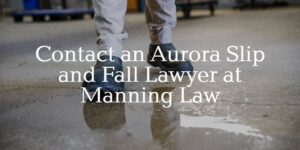Even though nobody expects that they will be injured in a slip and fall accident, the reality is that these incidents regularly cause injuries to those in and around the Aurora area. Unfortunately, it is not uncommon for us to discover that slip and fall accidents are caused by the careless or negligent actions of property owners. At Manning Law, our team is standing by to help when you need an Aurora slip and fall accident attorney. We will fully investigate what caused the incident and work diligently to recover the compensation you need to get through this.
Slip and fall claims in the Aurora area often result in injury victims going up against property owners and aggressive insurance carriers. However, a slip and fall accident lawyer can provide the resources necessary to level the playing field and conduct a complete investigation into the incident.
An Aurora slip and fall accident lawyer will not only ensure that their client is evaluated by a trusted medical provider, but they will work with economic professionals who can help properly calculate the total expected losses. An attorney will vigorously negotiate with the insurance carrier and property owner to ensure that the client receives the compensation they are entitled to.
Slip and fall accidents can happen anywhere, but it is the duty of property owners to ensure that any person who has a right to be on the property is as safe as reasonably possible. This includes properly monitoring and maintaining the premises that are under their control.
Some of the most common causes of slip and fall accidents in the Aurora area include the following dangers:
These are certainly not all of the ways that slip and fall accidents can occur in and around the Aurora area. We strongly suggest that you call one of our Aurora slip and fall accident attorneys so we can offer a free consultation to determine the best steps moving forward for your case.

To establish negligence in a slip-and-fall case requires one or more of the following:
The liabilities of a responsible person can be mitigated if the injured person was trespassing, was acting carelessly or should have been aware of the condition when the “reasonable person” standard is applied. Working with a skilled Aurora premises liability attorney can help you determine negligence in your slip and fall claim and hold the negligent party responsible for your injuries.
In Colorado, there are three categories of damages: economic, non-economic and punitive. If negligence is established in a slip-and-fall case, then the injured person has the right to seek relief.
Economic damages are tangible. This means the damages are proven by receipts and reports that evidence the actual out-of-pocket expenses paid by the injured person for medical treatments, prescriptions, physical therapy, repairs to a vehicle, and the like. Lost wages are also an economic damage. In Colorado, there is no cap on the award for economic damages. The intent of the recovery of economic damages is to place the injured person in the same financial position as though the injury did not occur.
The damages under the non-economic category are intangible and cannot be easily proven. The damages are the pain and suffering, mental anguish, loss of consortium, and the like suffered by the injured person. In Colorado, these damages are capped at $300,000.
Another category of damages is punitive. While the other damage categories focus on the losses of the injured party, punitive damages are awarded to further punish the responsible party. The amount awarded for punitive damages cannot exceed the total of the economic and non-economic damage awards. Effectively, if the full amount of punitive damages is awarded, then the value of the claim would double.
In Colorado, an injured person must pursue a slip-and-fall claim in civil court within two years from the date of the incident. If a claim is filed after this two-year period, then it is very likely that the claim will be dismissed and the injured person’s right to seek relief will be forever barred.
As with many laws and rules, there are exceptions. However, the exceptions to the statute of limitations are narrow and limited and typically do not apply to slip-and-fall claims that do not result in a wrongful death or are not pursued against a government entity. If you lost a loved one in a fatal slip and fall accident, get legal representation from an Aurora wrongful death attorney to seek compensation and hold the negligent party responsible.
If you or somebody you love has been injured in a slip and fall accident caused by the careless or negligent actions of a property owner in the Aurora, Colorado area, reach out to the team of Aurora personal injury attorneys at Manning Law for help immediately. Our attorneys want to get to work investigating your claim as soon as possible. We will work diligently to help you recover compensation for your medical bills, lost wages, pain and suffering damages, and more. When you need an Aurora slip and fall accident attorney, you can contact us for a free consultation by clicking here or calling us at (720) 515-3191.
